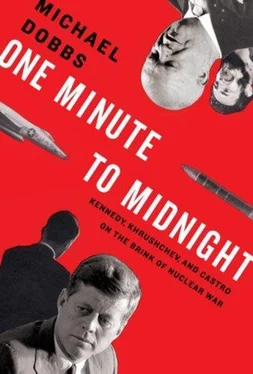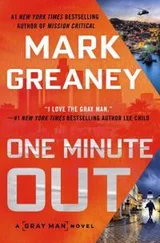“Eyeball to Eyeball”
8:00 A.M. WEDNESDAY, OCTOBER 24 (3:00 P.M. MOSCOW)
Nikita Khrushchev saw no need to communicate directly with his own people at a time of grave international crisis. Even though he was the most personable of Soviet leaders—allowing himself to be photographed strolling through cornfields or waving his fists in the air—public opinion was a relatively minor concern. Unlike Kennedy, he did not face midterm elections. Unlike Castro, he did not need to rally his people against an invasion.
His main goal was to project a sense of business as usual. He went out of his way to be friendly to visiting Americans. The previous evening, he and other Soviet leaders had gone to the Bolshoi Theater for a performance of Boris Godunov with the American bass Jerome Hines, joining the singers afterward for a glass of champagne. His latest visitor was William Knox, the president of Westinghouse Electric International.
Knox was in Moscow to explore possible manufacturing deals. His knowledge of the Soviet Union was so limited that he had to ask Khrushchev to identify the sage with the large bushy beard whose portrait hung on the wall of his huge Kremlin office. “Why, that’s Karl Marx, the father of Communism,” a surprised first secretary replied. Two nights earlier, the Westinghouse president had been woken from a deep sleep by the roar of military vehicles and brilliant searchlights shining into his hotel room opposite the Kremlin. “It was hard to believe my eyes,” he wrote later. “Red Square was full of soldiers, sailors, tanks, armored personnel carriers, missiles of various lengths up to at least 100 feet, jeeps, artillery, etc. I simply could not figure it out!” It was not until the following morning that he found out that the nighttime exercise had been part of preparations for the annual November 7 Revolution Day parade.
The president of an electricity company was a strange choice for the role of superpower emissary. Knox’s most important attribute was that he embodied the Soviet preconception of the American ruling class. Steeped in Marxist ideology, Khrushchev really did believe that corporate CEOs ran the U.S. government, like puppetmasters pulling strings behind the scenes. Hearing that a prominent capitalist was in town, he summoned Knox to the Kremlin at less than an hour’s notice.
The message Khrushchev wanted to send America via Knox was that he was standing firm. He conceded for the first time that the Soviet Union had deployed nuclear-tipped ballistic missiles on Cuba, but insisted they were there for “defensive” purposes only. Everything depended on the motive of the person with the weapon, he explained. “If I point a pistol at you like this in order to attack you, the pistol is an offensive weapon. But if I aim to keep you from shooting me, it is defensive, no?” He said he understood that Cubans were a “volatile people,” which was why the missiles would remain under Soviet control.
Having confirmed the presence of the medium-range missiles in Cuba, Khrushchev next alluded to the short-range cruise missiles. If Kennedy really wanted to know what kind of weapons the Soviet Union had deployed to Cuba, all he had to do was order an invasion, and he would find out very quickly. The Guantanamo Naval Base would “disappear the first day.”
“I’m not interested in the destruction of the world,” Khrushchev told Knox, “but if you want us to all meet in Hell, it’s up to you.”
He then related one of his favorite anecdotes, about a man who had to move in with his goat after falling on hard times. Although he did not like the smell, he eventually became accustomed to it. Russians, Khrushchev said, had been “living with a goat” in the form of NATO countries like Turkey, Greece, and Spain for a very long time. Now Americans would have to get used to their own goat in Cuba.
“You aren’t happy with it and you don’t like it, but you’ll learn to live with it.”
10:00 A.M. WEDNESDAY, OCTOBER 24
At the White House, the morning ExComm meeting began as usual with an intelligence briefing from John McCone. Colleagues had dubbed the ritual “Saying Grace,” because of the CIA director’s staunch Roman Catholic faith and droning papal delivery. According to the latest intelligence information, twenty-two Soviet ships were headed for Cuba, including several suspected of carrying missiles. Many of the ships had been receiving urgent radio messages from Moscow in unbreakable code.
McNamara reported that two of the Soviet ships, the Kimovsk and the Yuri Gagarin, were approaching the quarantine barrier, a five-hundred-mile radius from the eastern tip of Cuba. A Soviet submarine was stationed between the two vessels. The Navy planned to intercept the Kimovsk with a destroyer, while helicopters from an aircraft carrier attempted to divert her submarine escort. The Finnish-built Kimovsk had unusually long ninety-eight-foot cargo hatches, designed for lumber but well suited for missiles. The rules of engagement promulgated by Admiral Anderson authorized the destruction of the Soviet ships if they failed to comply with U.S. Navy instructions.
“Mr. President, I have a note just handed to me,” interrupted McCone. “We’ve just received information…that all six Soviet ships currently identified in Cuban waters—and I don’t know what that means—have either stopped or reversed course.”
There was a hubbub at the table and a gasp of “Phew!” but Secretary of State Rusk quickly squelched any sense of relief.
“Whadya mean ‘Cuban waters’?”
“Dean, I don’t know at the moment.”
Kennedy asked if the ships that had turned around were incoming or outgoing. The CIA chief did not have an answer.
“Makes some difference,” mumbled Rusk dryly, as McCone stepped out of the room to investigate. His remark was greeted with nervous laughter.
“Sure does,” said Bundy.
Kennedy was alarmed by the thought that the first confrontation of the crisis might involve a Soviet submarine. He wanted to know how the Navy would respond if a Soviet submarine “should sink our destroyer.” Without replying directly, McNamara told the president that the Navy planned to use practice depth charges to signal that Soviet submarines should surface. The depth charges would not cause any damage even if they hit the submarines.
From the other side of the Cabinet Room, Bobby saw his brother’s hand go up to his face and cover his mouth: “He opened and closed his fist. His face seemed drawn, his eyes pained, almost gray. We stared at each other across the table. For a few fleeting seconds, it was almost as though no one else was there and he was no longer the President.”
Suddenly, Bobby found himself thinking of the tough times they had had as a family, when Jack was ill with colitis and almost died, when their brother Joe Junior was killed in an airplane accident, when Jack and Jackie lost their first child through a miscarriage. The voices in the Cabinet Room seemed to blur together until Bobby heard Jack ask if it was possible to defer an attack on the submarine. “We don’t wanna have the first thing we attack [be] a Soviet submarine. I’d much rather have a merchant ship.”
McNamara disagreed. Interfering with the on-scene naval commander, he told the president firmly, could result in the loss of an American warship. The plan was to “put pressure” on the submarine, “move it out of the area,” and then “make the intercept.”
“OK,” said Kennedy, doubtfully. “Let’s proceed.”
Half a mile down Sixteenth Street, at the Soviet Embassy, diplomats crowded around radios and television sets. They were as much in the dark about the Kremlin’s intentions as everyone else. They watched with mounting tension as the networks reported Soviet vessels approaching an imaginary line in the ocean, counting down the hours and minutes until they came face-to-face with American warships. Dobrynin would later describe October 24 as “probably the most memorable day in the whole long period of my service as ambassador to the United States.”
Читать дальше












